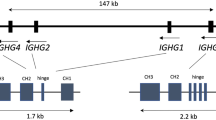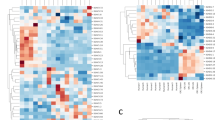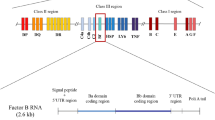Abstract
THE study of evolutionary relationships by immunological comparison of homologous proteins from different species has been limited by the complexity and variability of conventional heteroantisera1. These problems can be avoided by using selected panels of monoclonal antibodies, specific for single antigenic determinants, which would enable detailed immunochemical descriptions of homologous proteins to be made2. The human HLA-A,B,C antigens and their homologues provide a particularly interesting system for this type of analysis3. Although they are extraordinarily polymorphic within species, many features of their structure, including association with β-microglobulin, have been highly conserved during evolution4–6. A preliminary survey showed that monoclonal antibodies with specificity for the HLA-A,B,C–β2-microglobulin complex reacted with primate species but not with non-primates7. We have therefore concentrated on comparing primate species with a panel of anti-A,B,C monoclonal antibodies. We report here the finding that two different anti-HLA-A,B,C monoclonal antibodies with no demonstrable polymorphic specificity in humans define polymorphisms in owl and spider monkeys, thus demonstrating the potential of these reagents for fine structure antigenic mapping.
This is a preview of subscription content, access via your institution
Access options
Subscribe to this journal
Receive 51 print issues and online access
$199.00 per year
only $3.90 per issue
Buy this article
- Purchase on Springer Link
- Instant access to full article PDF
Prices may be subject to local taxes which are calculated during checkout
Similar content being viewed by others
References
Williams, C. A. in Evolutionary and Genetic Biology of Primates (ed. Buettner-Janusch, J.) 25 (Academic, New York, 1964).
Köhler, G. & Milstein, C. Nature 256, 495 (1975).
Götze, D. (ed.) The Major Histocompatibility System in Man and Animals (Springer, Berlin, 1977).
Dick, H. M. in Histocompatibility Testing, 157 (Munksgaard, Copenhagen, 1978).
Coligan, J. E. et al. Molec. Immun. 16, 3 (1979).
Ploegh, H. L. et al. in Biological Markers of Neoplasia (ed. Ruddon, H.) 201 (Elsevier, Amsterdam, 1978).
Brodsky, F. M., Bodmer, W. F. & Parham, P. Eur. J. Immun. (in the press).
Barnstable, C. J. et al. Cell 14, 809 (1978).
Ma, N. S. F. et al. Lab. Anim. Sci. 26, 1022 (1976).
Parham, P. & Bodmer, W. F. Nature 276, 397 (1978).
Parham, P. et al. J. biol. Chem. 252, 7555 (1977).
Klein, J. Transplantation 13, 291 (1972).
Parham, P., Barnstable, C. J. & Bodmer, W. F. J. Immun. (in the press).
Williams, A. F. Contemp. Topics molec. Immun. 6, 83 (1977).
Author information
Authors and Affiliations
Rights and permissions
About this article
Cite this article
PARHAM, P., SEHGAL, P. & BRODSKY, F. Anti-HLA-A,B,C monoclonal antibodies with no alloantigenic specificity in humans define polymorphisms in other primate species. Nature 279, 639–641 (1979). https://doi.org/10.1038/279639a0
Received:
Accepted:
Issue Date:
DOI: https://doi.org/10.1038/279639a0
This article is cited by
-
Conservation of HLA class I private epitopes in macaques
Immunogenetics (1988)
-
Ethical and legal considerations in the care of the infant with end-stage renal disease whose parents elect conservative therapy
Pediatric Nephrology (1987)
-
Use of monoclonal antibodies in genetic research with nonhuman primates
Genetica (1987)
-
Two distinct forms of ? 2-microglobulin in different races of owl monkey (Aotus trivirgatus)
Immunogenetics (1984)
-
Evolution of epitopes on human and nonhuman primate lymphocyte cell surface antigens
Immunogenetics (1983)
Comments
By submitting a comment you agree to abide by our Terms and Community Guidelines. If you find something abusive or that does not comply with our terms or guidelines please flag it as inappropriate.



